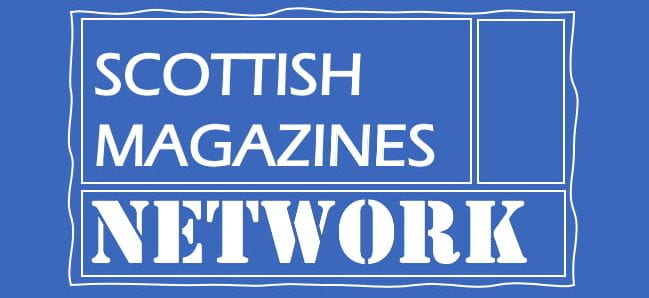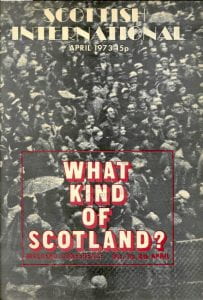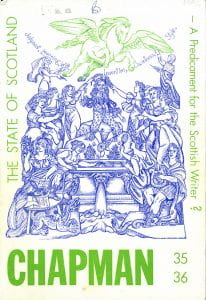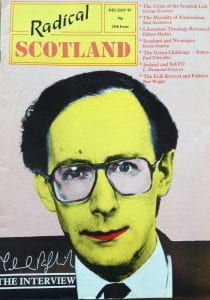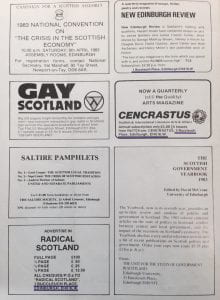Sparked by Scottish International (Review) in 1968, a range of small independent magazines played a major creative role in Scottish literature, culture and politics over the next three decades.
Fostered by the Scottish Arts Council, these titles featured (publicly subsidised) poetry and short fiction, and were the key venue in which writers, journalists and campaigners developed a shared agenda centred on Scottish cultural difference, literary revival and democratic dissent. Writing in Radical Scotland in 1983, George Kerevan noted that ‘politics is no longer confined to the Establishment and Labourist agenda of economic tinkering. Cultural values represent a new Second Front’.
The arena of this ‘second front’ was established – and gradually expanded – by titles such as New Edinburgh Review (from 1969), Chapman (1970), Crann-Tàra (1977), MsPrint (1978) and Cencrastus (1979). By the 1980s, these magazines had significant influence on the ‘first’ front – the field of electoral politics – in yoking together assertions of Scottish cultural identity and demands for constitutional change.
Looking back, we can see post-1960s magazine culture as the laboratory in which the discourse and identity of the ‘new’ Scotland was experimentally debated, strategised and disseminated.
Aims
The network’s aims include:
- producing resources, stimulating collaborations, and developing critical frameworks which enable new research in Scottish cultural and political magazines of the post-1960s period
- boosting the profile of these periodicals among scholars and the wider public, highlighting their value for investigating inter-related developments in post-war Scottish literature, politics and culture
- preparing the ground for a subsequent digital resource project enabling readers and scholars to further investigate these magazines
Publications
In addition to our five networking events, SMN will produce an edited volume of essays provisionally entitled Scottish Magazines and Political Culture 1968-98: From Scottish International to the Scottish Parliament.
We have also created a collectible project magazine, FLYTE, to showcase four key titles and the broader aims of the network. FLYTE is available digitally and as a printed magazine, and has been styled to resemble our target periodicals with the assistance of an illustrator closely engaged with the original magazines.
Further detail on the project’s aims can be found in this introductory blog.
PROJECT TEAM
Principal Investigator: Dr Scott Hames, Scottish Literature, University of Stirling
Co-Investigator: Dr Malcolm Petrie, Scottish History, University of St Andrews
Project administrator: Alice Piotrowska, University of Stirling
Steering Group
[PI+Co-I]
Dr Angela Bartie (History – University of Edinburgh)
Dr Eleanor Bell (Literature – University of Strathclyde)
Dr Corey Gibson (Literature – University of Glasgow)
Graeme Hawley (Head of General Collections, National Library of Scotland)
Dr Sarah Leith (History – University of St Andrews)
Dr Rory Scothorne (History – University of Edinburgh)
Dr Alex Thomson (Literature – University of Edinburgh)
NLS Partners
Sarah Ames (Digital Scholarship Librarian)
Ines Byrne (Digital Transition Manager)
Fredric Saunderson (Rights and Information Manager)
Advisory Board
Dr Rachael Alexander (Journalism and Magazine Studies – University of Strathclyde)
Dr Alexandre Campsie (Scottish History – University of Aberdeen)
Professor Patrick Collier (Literature and Periodical Culture – Ball State University)
Professor Faye Hammill (Literature and Magazine Studies – University of Glasgow)
Dr Ben Jackson (Political History – University of Oxford)
Professor Lorna M. Hughes (Digital Humanities – University of Glasgow)
Charlotte Lauder (Scottish Popular Magazines – University of Strathclyde)
Professor Alistair McCleery (Scottish Publishing and Magazines – Edinburgh Napier)
Professor Glenda Norquay (Scottish Literature – Liverpool John Moores University)
Nikki Simpson (International Magazine Centre, Edinburgh)
Dr J.J. Smyth (Scottish History, University of Stirling)
